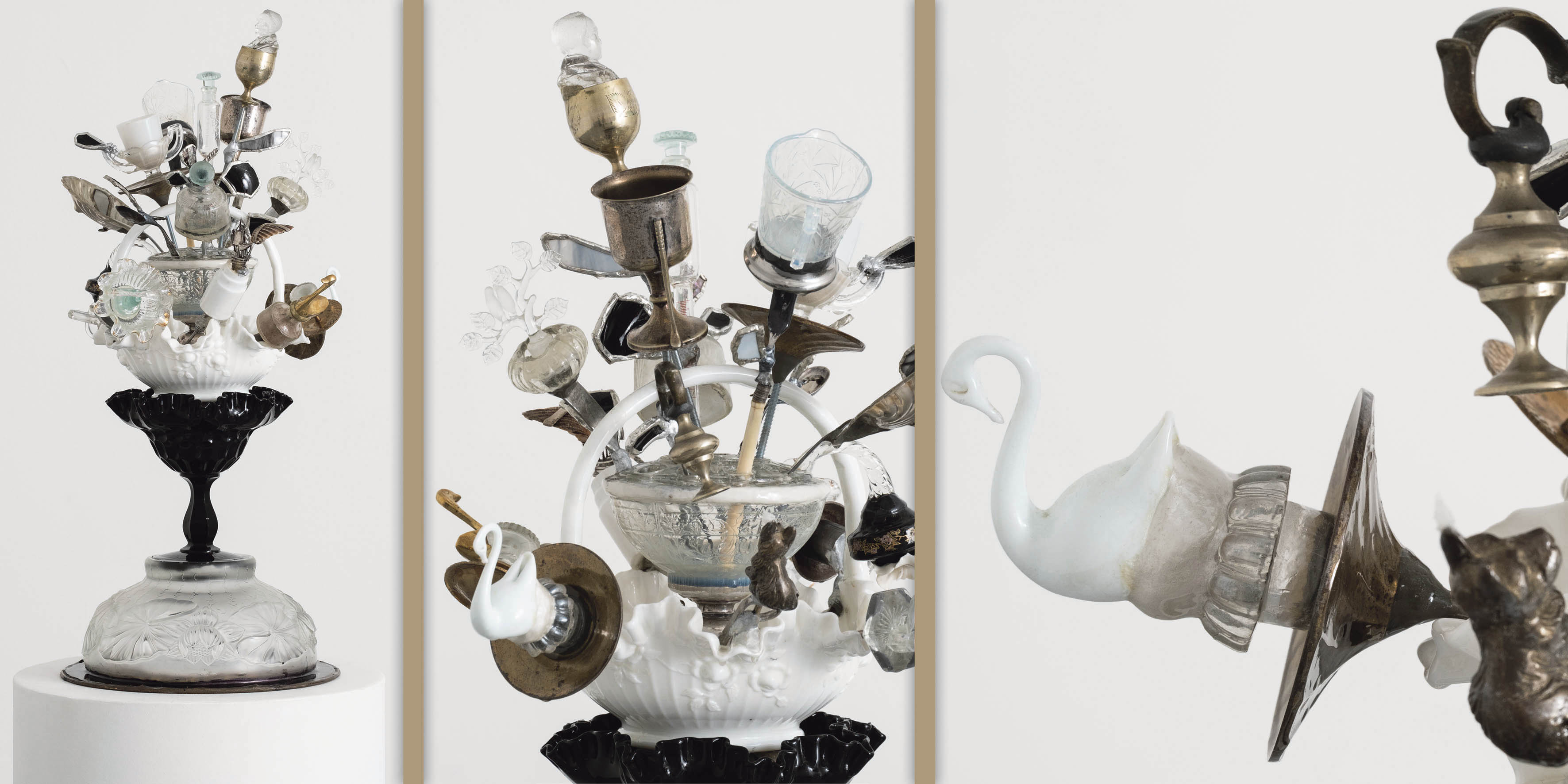Are all parents of Generation Xers hoarders? Surely I’m not the only one who grew up with parents with a tendency to latch on to items for a little too long? Even after they had done renovations, my parents insisted on keeping their old bathtub. Why?
Such is life’s irony that I’ve adopted this habit, but I’m not alone. Stephané Edith Conradie has made hoarding kiff, and me and my home girls are living it (yes, clap for my cross-generational sentence).
But of course, it’s more nuanced than that.
Conradie’s latest exhibition, titled Wegwysers deur die Blinkuur (Signposts through the Twilight), explores the transference of legacy through items we find in our homes. The title can also be read to refer to a set of guides offering clarity during a period of transition.
Her works are made from (or made to resemble) found objects. In their material capacity, seeing these familiar objects held together when they should not be speaks to the fractured nature of the artist’s heritage. They also invite her audience to walk with her as she questions the prompts attached to them.
“I’m really obsessed with material, objects and material things,” the artist said. “Because we moved from Namibia to the Northern Cape to Cape Town, although there are some similarities between cultural groups, it is quite different, but I was interested in the intersection of home cultures.”
It’s understandable how such a diverse upbringing can push our convictions to question all things around us, especially the tangible ones. Our most striking memories are often triggered by objects, tastes and sounds that evoke vivid recollections of days gone past.
From the first sight of any piece on display, you are immediately transported to what feels like a time capsule. The shapes of each piece will have you thinking your last drink had a sprinkle of that Woodstock magic powder, but your eyes aren’t deceiving you – that is a glass shisha apparatus with some pendants, crafted fully, put together.
“For this exhibition, I wanted to see how I can insert more of a personal voice that altered the found object to become something else. You can read each object in its singularity, but you read more in the form it takes together.”
 A piece titled ǁkhu faias. (Photo: Supplied)
A piece titled ǁkhu faias. (Photo: Supplied)
The exhibition includes audio and copy that aid the viewer’s experience when engaging the art pieces. One bit of copy reads:
“And so, history is continually being glued together and put together in strange formations.”
This best frames the lens with which the work invites one to interact – devoid of binaries.
“I was particularly interested in capturing the pain, joy and uncertainty that are linked to the inevitability of death. How do different groups prepare for this imminent event? Can it be captured in a tangible sense, or is the bundling more invisible, spiritual or fragmented?”
Transitions are a pertinent theme in this exhibition by the 2023 Standard Bank Young Artist winner in the visual art category. Engaging with such a complex theme has prompted deep-rooted discourse both in terms of Conradie’s own experience, and how we as people navigate change.
She made interesting use of eco-printing, the process of wrapping and steaming plant material onto fabric to create beautiful patterns and prints. This was particularly special as it is a technique passed down to her by her mother.
Whereas flowers would decompose, this method of eco-printing enabled a way of capturing the invisible and, to a certain degree, the spiritual resonance the objects have.
The trick is not only to look and receive the information an object might be communicating to us in the context of our modern time, but also through what has been and what is to come, with a particular reverence to the people who came before and saw fit to keep said item.
“Whereas people see these objects as tainted, I see it as a form of resistance and storytelling. In a home environment they become invisible until you ask somebody to explain why they are keeping that thing. I love the duality of it, that it’s everyday but sacred at the same time – it’s that for me.”
I’m pretty sure my parent’s reasons for keeping the bathtub are not that deep, but Conradie’s mention of sociopolitical resistance hits a nerve.
The ever-globalising world can easily blur the lines between cultural actions or objects and fads. It’s no longer surprising that my father still carries the same knobkerrie he’s had since we lived in KwaZulu-Natal – it hits home (y’all know I’m a bit of a cornball by now – indulge me).
The learning never stops, even for Conradie, who is a lecturer in print media at the Michaelis School of Fine Art at the University of Cape Town. Whether it’s through objects, spoken word or any other media, she is a sucker for all forms of education.
“I value the knowledge exchange that takes place. Because they (the students) get a chance to do work on their lived experience, you’re always learning something. It’s a very enriching experience.”
The wealth of knowledge has been successfully translated in Conradie’s art. It is compelling and ethereal, imaginative and non-prescriptive while instantly alluring. Her ability to intertwine generational narratives in an abstract manner makes her exhibition a must-see. DM
Wegwysers deur die Blinkuur is on at the Standard Bank Art Gallery in Johannesburg until 31 October.
S’bo Gyre is a multidisciplinary artist based in Johannesburg.
This story first appeared in our weekly Daily Maverick 168 newspaper, which is available countrywide for R35.





 A piece titled ǁkhu faias. (Photo: Supplied)
A piece titled ǁkhu faias. (Photo: Supplied)